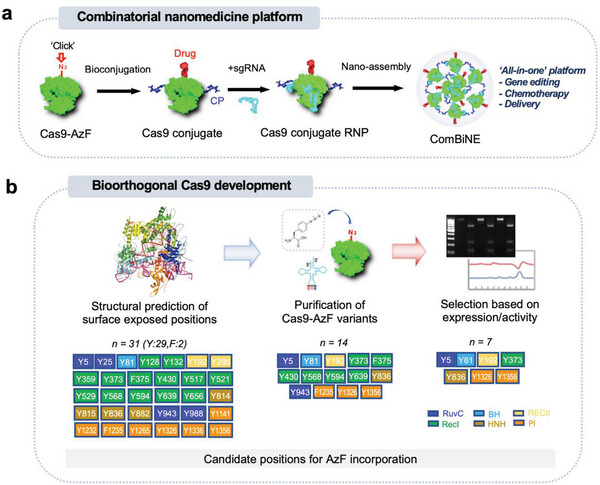The Korean Advanced Institute of Science and Technology (KAIST) said Thursday that its researchers developed a nano-composite that simultaneously delivers CRISPR proteins and drugs in vivo with superior anticancer efficacy compared to existing therapies.

CRISPR technology precisely and permanently causes gene modification in target cells, which has significant advantages as a treatment for cancer compared to conventional gene regulation methods.
However, when CRISPR's components, such as proteins and guide RNA are delivered in vivo, their therapeutic efficacy is reduced due to extremely low tissue permeability. Nanocarriers, such as lipid nanoparticles, polymers, and inorganic nanoparticles, aim to address these shortcomings but lack efficacy and are accompanied by toxicity and other side effects.
The study led by Professors Chung Hyun-jung of Biological Sciences and Park Hee-sung of Chemistry, developed a bio-orthogonalized Cas9 by introducing non-natural amino acids into the CRISPR protein Cas9 to embed different functional groups. The team discovered that by conjugating tiny amounts of polymeric materials to the bioactive Cas9, safe in vivo delivery and gene correction can occur.
To maximize its efficacy as an anticancer drug, the team developed a gene-editing nano-complex, ComBiNE (Combinatorial and bioorthogonal nano-editing) complex for combination therapy by binding olaparib, an existing breast cancer drug, to Cas9.
The researchers confirmed superior anticancer effects, including DNA repair in breast cancer cells, compared to conventional anticancer drugs and monotherapy when olaparib was combined with the developed gene-editing nano-complexes.
“This study is the first to demonstrate safe and effective in vivo gene correction with a single formulation of a chaperone protein and a chemotherapeutic agent, resulting in high anticancer efficacy,” the researchers said. “We hope the results are applied as a gene and chemical drug-based combination therapy for various cancer types in the future.”
The study was published in the Advanced Science journal on Jul. 23.

